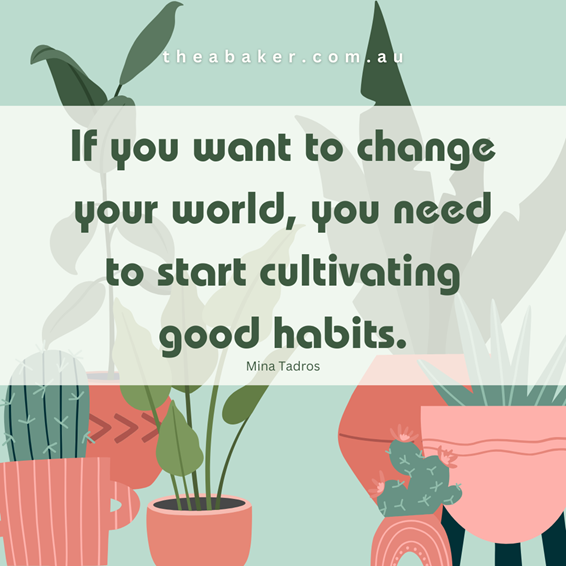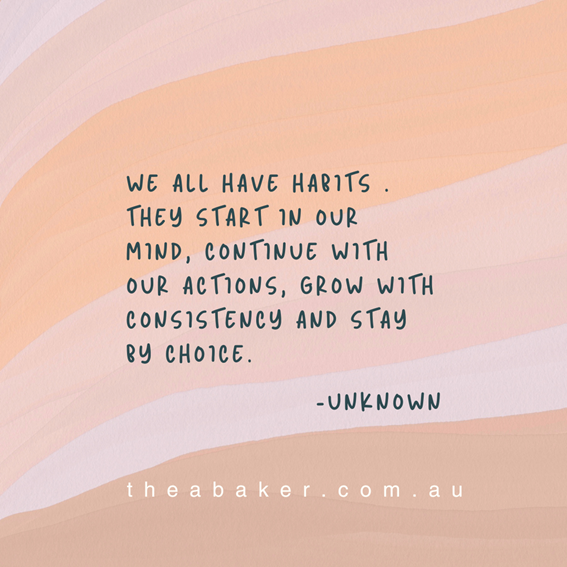Habits that support your mental health
Habits that support your mental health
I’m a big fan of habits and routines. I have spent the last few weeks back at work after the Christmas break but feeling all ‘out of sorts’ because the children were still on their long summer holidays. This week the schools went back, and the routine that I’ve been used to for the last 12 years kicked back in and I have got to be honest, it has made me feel so much more settled, focused, and present in my work. The difference was so stark that it made me do a bit of a deep dive into how routine is good for our mental health (and when maybe it gets a bit tricky).

To put this into some kind of perspective, I’ve always loved a routine. Or at least routine has been a big part of my life since I was 10 years old and I started boarding school. In boarding schools the staff (in my case a mixture of housemistresses and matrons) make sure pretty much every minute of your day from when they wake up in the morning until ‘light’s out’ at bed-time is timetabled for something. We had very little ‘free time’. The thinking was, we’d have less time to be sad and homesick if we were busy. And they were right. So, after six years of this very structured life, routine just kind of stuck for me, the difference was that after boarding school I learned to create my own because it made me feel better – safer. Since then I’ve adopted different sorts of routines or habits at different times – there was the one where I swam every day as part of my training when I was part of a swimming team/club, the morning mediation and journaling phase, and more recently the morning walk routine. I also have a bedtime routine and I’m pretty structured around my day in general.
A few years back it was seen as somewhat problematic to be a ‘creature of habit’ – like somehow you might not cope if your routine was thrown off. Or maybe it came with a perception of rigid boundaries (see last week’s blog HERE) and an inflexible personality. Now though, there’s an appreciation that whilst there’s no one-size fits all human approach, routines can have important and beneficial psychological implications, particularly for people who are struggling to with anxiety, stress, insomnia, depression and ADHD. Routines provide us with a sense of rhythm and certainty – some semblance or predictability and control for our inner and outer uncertain world’s.

The other thing about developing routines is that we don’t have to worry, think or plan them. Once the situation and / or behaviour is familiar (habitual) the outcome becomes safe, calm and predictable. It’s something we don’t have to give too much energy to, and we can do it reasonably well. Developing a sense of mastery over even the simplest things (like going for a daily walk) can have profound benefits for our mental health. When we extend those habits or routines to things like what we regularly wear (think Steve Jobs and his black rollneck) there’s an argument that the automation of these behaviours can free up the mental resources for the more demanding or complex undertaking that adulting requires. This, it is argued, allows for greater creativity in other more exciting parts of life.
However, when held too rigidly, routines can become self-imposed prisons. For some it can be the beginning of obsessive behaviours or compulsions, where certain behaviours are bonded with safety against our worst fears eventuating. This is also true of some eating disorders. In other situations, we don’t want the performance or outcomes of our routines to become attached to our sense of self-worth. As with many other things that we talk about in session, the goal here is ‘psychological flexibility’, which is the capacity to cope or respond in more ways than one. If you notice that you’re reacting poorly when you can’t complete your usual habit / routine you could try:
- Taking a break from your routine and be curious about how easy / difficult it feels for you
- Create a new one! (I’m a big fan of this because I can get bored after a while.) Still explore the meaning behind the behaviour so that it aligns with your purpose and / or values (it’s meaningful for you) but switch things up a bit
- Acknowledge the tension in the relationship you have with your routine and explore this – might be good to talk through with a good friend / family member or a therapist to try to help you restore some balance
I’m going to try this year to share extra resources if you want to go deeper on each topic we tackle in the weekly blog. This week, I’m suggesting Atomic Habits by James Clear. SUCH a great book (even my 16-year-old son is a fan)!
If you’d like help with navigating your own routines, please reach out to us at Thea Baker Wellbeing: hello@theabaker.com.au / 03 9077 8194.
